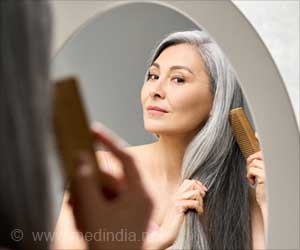
Age-related hair loss in women can have a strong impact on self-esteem and emotional well-being.
Hormonal changes during menopause include a rapid decline of ovarian estrogen hormone, and a relative increase in androgens.
Age-related changes in hair diameter and density that are independent of menopause that occur at the same time can compound the perception of hair loss among middle-aged women.
Treatment options are limited and only target a single hormone such as androgen-inhibiting therapies. The efficacy of such treatments is inconsistent and varied.
Currently, the only FDA-approved drug for the treatment of hair loss in women is topical minoxidil, which has potential side effects and many women find difficult to incorporate into daily haircare routine.
Multitargeted Approach
To overcome all these shortcomings in treatment, a study on the use of supplements for hair thinning in women going through the menopausal transition was conducted. The findings of the study were published in the Journal of Drugs in Dermatology.
This study introduced a novel nutraceutical supplement that has been specifically formulated to provide a multi-targeted approach to hair loss.
The supplement had a combination of standardized botanicals with clinically tested stress-adaptogenic, antioxidant, anti-inflammatory, dihydrotestosterone (DHT)-inhibiting, and hormone-balancing properties.
READ RELATED: Rosacea or excessive blood vessels: What's causing your red cheeks? How to treat it
Then researchers demonstrated the efficacy of this new nutraceutical supplement in promoting hair growth among perimenopausal, menopausal, and postmenopausal women.
Menopause, perimenopause, and postmenopause are the end stages of a woman’s reproductive years.
- Peri-menopause is the first stage in this process and can start eight to 10 years before menopause.
- Menopause is the point when a woman no longer has menstrual periods for at least 12 months.
- Post-menopause is the stage after menopause.
They compared results at 6 months and 12 months of treatment and found that mean total hair counts increased progressively. Global hair quality is also increased by 40% with few or no side effects, along with a decrease in hair shedding.
New Insights
The currently studied formulation contains optimized dosages and added botanical ingredients that target relative hormonal shifts that occur in menopause.
The results of this new study suggest that the local balance of estrogen and androgen hormones metabolized at the follicle influences hair growth by signalling several other hormones, transcription factors, growth factors, and cytokines.
Other significant changes which affect the hair follicle through and after menopause such as increased oxidative stress and inflammation, stress-related increases in cortisol, metabolic changes, and changes in nutritional status can also be corrected by this supplement.
Tips to Prevent Menopause Hair Loss
- Reduce stress
- Incorporate exercise into the daily routine
- Eat a well-balanced diet
- Have eight 8-ounce glasses of water per day
- Stay away from extensions and other styling methods
- Choose all-natural hair color
- Talk to a doctor about medications that might be causing hair loss
References :
- Nutrition of women with hair loss problem during the period of menopause – (https://www.ncbi.nlm.nih.gov/pmc/articles/PMC4828511/)
- Vulvovaginal Changes – (http://www.menopause.org/publications/clinical-care-recommendations/chapter-2-midlife-body-changes)
- THINNING HAIR AND HAIR LOSS: COULD IT BE FEMALE PATTERN HAIR LOSS? – (https://www.aad.org/public/diseases/hair-loss/types/female-pattern)
Source: Medindia
Source:









